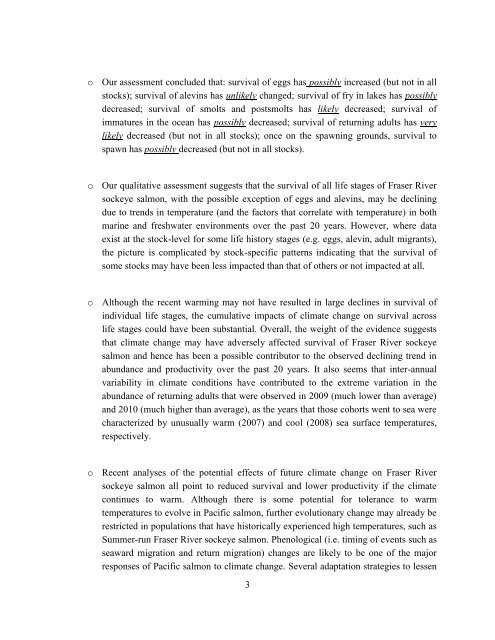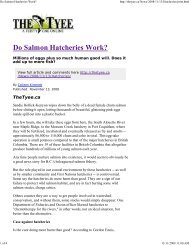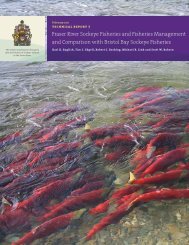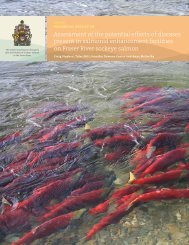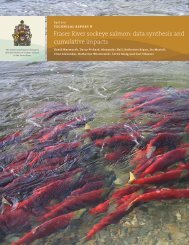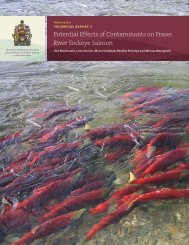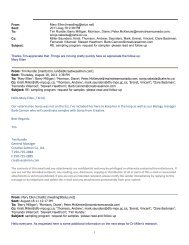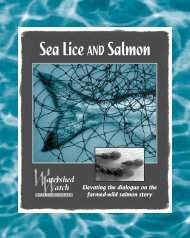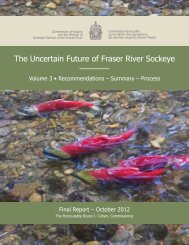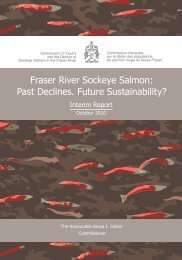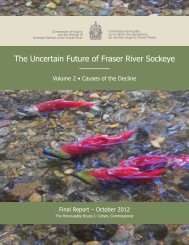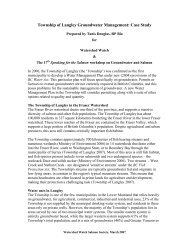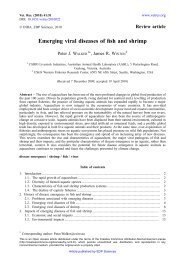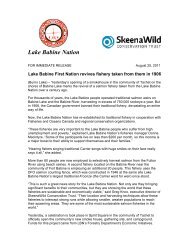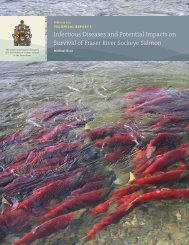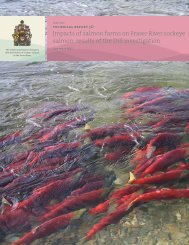Climate Change - Cohen Commission
Climate Change - Cohen Commission
Climate Change - Cohen Commission
Create successful ePaper yourself
Turn your PDF publications into a flip-book with our unique Google optimized e-Paper software.
o Our assessment concluded that: survival of eggs has possibly increased (but not in all<br />
stocks); survival of alevins has unlikely changed; survival of fry in lakes has possibly<br />
decreased; survival of smolts and postsmolts has likely decreased; survival of<br />
immatures in the ocean has possibly decreased; survival of returning adults has very<br />
likely decreased (but not in all stocks); once on the spawning grounds, survival to<br />
spawn has possibly decreased (but not in all stocks).<br />
o Our qualitative assessment suggests that the survival of all life stages of Fraser River<br />
sockeye salmon, with the possible exception of eggs and alevins, may be declining<br />
due to trends in temperature (and the factors that correlate with temperature) in both<br />
marine and freshwater environments over the past 20 years. However, where data<br />
exist at the stock-level for some life history stages (e.g. eggs, alevin, adult migrants),<br />
the picture is complicated by stock-specific patterns indicating that the survival of<br />
some stocks may have been less impacted than that of others or not impacted at all.<br />
o Although the recent warming may not have resulted in large declines in survival of<br />
individual life stages, the cumulative impacts of climate change on survival across<br />
life stages could have been substantial. Overall, the weight of the evidence suggests<br />
that climate change may have adversely affected survival of Fraser River sockeye<br />
salmon and hence has been a possible contributor to the observed declining trend in<br />
abundance and productivity over the past 20 years. It also seems that inter-annual<br />
variability in climate conditions have contributed to the extreme variation in the<br />
abundance of returning adults that were observed in 2009 (much lower than average)<br />
and 2010 (much higher than average), as the years that those cohorts went to sea were<br />
characterized by unusually warm (2007) and cool (2008) sea surface temperatures,<br />
respectively.<br />
o Recent analyses of the potential effects of future climate change on Fraser River<br />
sockeye salmon all point to reduced survival and lower productivity if the climate<br />
continues to warm. Although there is some potential for tolerance to warm<br />
temperatures to evolve in Pacific salmon, further evolutionary change may already be<br />
restricted in populations that have historically experienced high temperatures, such as<br />
Summer-run Fraser River sockeye salmon. Phenological (i.e. timing of events such as<br />
seaward migration and return migration) changes are likely to be one of the major<br />
responses of Pacific salmon to climate change. Several adaptation strategies to lessen<br />
3


